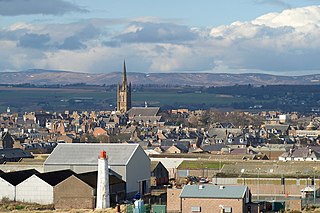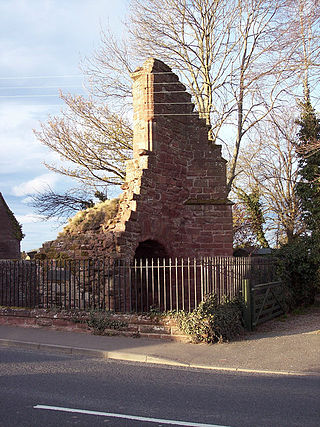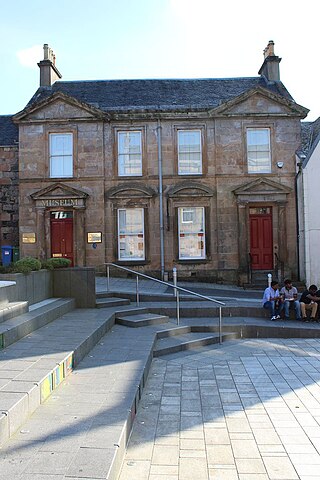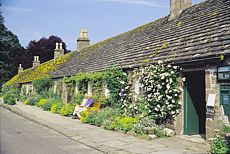
Angus is one of the 32 local government council areas of Scotland, and a lieutenancy area. The council area borders Aberdeenshire, Dundee City and Perth and Kinross. Main industries include agriculture and fishing. Global pharmaceuticals company GSK has a significant presence in Montrose in the east of the county.

Arbroath or Aberbrothock is a former royal burgh and the largest town in the council area of Angus, Scotland, with a population of 23,902. It lies on the North Sea coast, some 16 miles (26 km) east-northeast of Dundee and 45 miles (72 km) south-southwest of Aberdeen.

Montrose is a town and former royal burgh in Angus, Scotland. Situated 28 miles north of Dundee and 37 miles south of Aberdeen, Montrose lies between the mouths of the North and South Esk rivers. It is the northernmost coastal town in Angus and developed as a natural harbour that traded in skins, hides, and cured salmon in medieval times.

Greenlaw is a town and civil parish situated in the foothills of the Lammermuir Hills on Blackadder Water at the junction of the A697 and the A6105 in the Scottish Borders area of Scotland. At the 2001 census, the parish had a population of 661.

The Burrell Collection is a museum in Glasgow, Scotland, managed by Glasgow Museums. It houses the art collection of Sir William Burrell and Constance, Lady Burrell. The museum opened in 1983 and reopened on 29 March 2022 following a major refurbishment. It was announced as the winner of the Art Fund Museum of the Year in July 2023. It is the only non-national museum to be the outright winner twice.

Stirling Smith Art Gallery and Museum, formerly The Smith Institute, is an art and local history museum in Stirling, Scotland. The museum was founded in 1874 at the bequest of artist Thomas Stuart Smith.

Perth Art Gallery is the principal art gallery and exhibition space in the city of Perth, Scotland. It is located partly in the Marshall Monument, named in memory of Thomas Hay Marshall, a former provost of Perth.

Coupar Angus Abbey was a Cistercian monastery near Coupar Angus, in central Scotland, on the boundary between Angus and Gowrie.

The Highland Folk Museum is a museum and an open-air visitor attraction in Newtonmore in Badenoch and Strathspey in the Scottish Highlands, United Kingdom.

The Postal Museum is a postal museum run by the Postal Heritage Trust. It began in 2004 as The British Postal Museum & Archive and opened in Central London as The Postal Museum on 28 July 2017.

The Riverside Museum is a museum in the Partick area of Glasgow, Scotland, housed in a building designed by Zaha Hadid Architects, with its River Clyde frontage at the new Pointhouse Quay. It forms part of the Glasgow Harbour regeneration project. The building opened in June 2011, winning the 2013 European Museum of the Year Award. It houses many exhibits of national and international importance. The Govan–Partick Bridge, provides a pedestrian and cycle path link from the museum across the Clyde to Govan, opened in 2024.

Verdant Works, also known as Scotland's Jute Museum, is a former jute mill in the Blackness area of Dundee, Scotland. It was purchased in 1991 by the Dundee Heritage Trust. The trust restored the buildings, which were officially opened by Prince Charles on 16 September 1996, as a museum dedicated to the textile industry, an industry that once dominated the city's economy.

Montrose Museum opened in 1842 in Montrose, Angus, Scotland. The museum came into being when in 1841 the Montrose Natural History and Antiquarian Society started a fund to expand its space; in order to house its curiosities and wonders ranging from geological and ethnographical artefacts to a collection of natural history objects and fine art. It was accredited by the Museums, Libraries and Archives Council in June 2009.

The West Highland Museum tells the story of the Scottish Highlands and the Islands. It aims to cover every aspect of West Highland history, including that of Fort William, where it is located in a listed building in the centre of the town. It also hosts other exhibits for archaeology and wildlife. The museum, which has always been independent, is a member of Museums Galleries Scotland.

Glenesk Folk Museum is a museum located in the Glen Esk valley, in Tarfside, Angus, Scotland. It is about 9 miles (14 km) north of the village of Edzell. It is housed in a former shooting lodge, known as 'The Retreat', which used to belong to the Earls of Dalhousie. The museum contains artefacts and documents related to the history of the surrounding area. It also has a shop selling locally produced gifts and a tearoom. The museum organises demonstrations of local skills and crafts.

St Vigeans Sculptured Stones Museum, located in the Angus village of St Vigeans, houses an outstanding collection of Pictish carved stones. St Vigeans, close to Arbroath, was the centre of a royal estate in the Early Middle Ages, and was of religious importance as a monastery founded in the 8th century. The present-day St Vigeans Church was built in the 12th century, on a 40-foot (12 m) mound.

The Montrose Air Station Museum is located to the north of Montrose, Angus, Scotland. Montrose has the distinction of having the first operational military airfield in Great Britain and the Heritage Centre is located on the former airfield.

Kinnordy House is an estate house near Kirriemuir in Angus, Scotland. The first house was built in the 1680s, when Inverquharity Castle was vacated; however, the current three-storey, towered and turreted structure dates from 1881, incorporating an 18th-century wing and stables. The house was the birthplace of the noted geologist Charles Lyell, and is associated with his friend Charles Darwin.



















